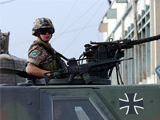When a War Isn't a War
By Jeff Black for ISN
The US and Britain have already said, more or less, what they plan to do: Send more troops (30,000 more from America, 500 from the UK); build up the Afghan security forces; leave as soon as possible.
Germany - which with up to 4,500 troops there has the third largest contingent - wants to wait for another seven weeks, until an international conference on the Afghan conflict planned for 28 January in London, before saying what it will do.
Berlin is playing for time.
This is because Germany has the most problematic relationship between the public and military action abroad of any NATO state – for historical reasons primarily, but now because of the scandal that engulfed Chancellor Angela Merkel's government in the wake of the 4 September Kunduz airstrike.
In that event – now described by Defense Minister Karl Theodor zu Guttenberg as “militarily inappropriate,” up to 142 people were killed, including perhaps dozens of civilians.
At the end of November it emerged that the Bundeswehr and Defense Ministry had external pageprobably withheld its knowledgecall_made of those civilian casualties from the public.
According to polls conducted by broadcaster ARD, the percentage of the population who want the Bundeswehr to withdraw as soon as possible from Afghanistan has risen since September by 12 points, to 69 percent.
Although ministers and government spokesmen will give no hint ahead of the London conference what the final decision will be, it is fairly clear at this stage that Germany will make at least a small increase in its presence in Kunduz province, from where it holds the regional command.
To do otherwise would endanger its position in NATO, one of the defining pillars of external pageGerman foreign policycall_made since World War II.
What remains to be done is some straight talking.
Until October, when the cabinet changed, no defense minister had ever dared to call the Afghan war a "war."
There is now a desire to move on from that old taboo.
Guttenberg has been lauded for his courage and tough-talking because he's calling it a "war-like situation."
The “war” description is more than a semantic subtlety. It is necessary to protect German soldiers, who are facing a worsening insurgency in the northern region, from prosecution under civilian law at home.
More importantly, it is necessary to convince the German public that the government will no longer beautify the reality of the Afghan conflict. Until now, the public has been fed a diet of stories of Afghan girls being taken to schools built by German engineers, and not much about the insurgency.
In the wake of the Kunduz scandal, where it became plain that the government was more or less lying to the public, this Afghan fairy tale is less convincing.
The chancellor needs to tell the German people, in a manner similar to that of US President Barack Obama, that Afghanistan is a job that has to be finished, and it will take more effort, and probably more fighting, to do it.

